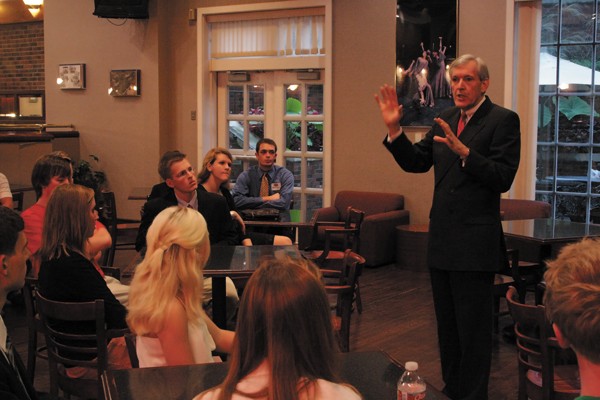
Dallas Mayor Tom Leppert speaks with the SMU College Republicans organization on Wednesday evening. MICHAEL DANSER/The Daily Campus
Mayor of Dallas Tom Leppert explained his goals and initiatives for improving Dallas’ standing both nationally and internationally on the evening of Oct. 14.
Leppert, a former White House Fellow during the Reagan administration, spoke in the Hughes-Trigg Varsity to a crowd of approximately 50 students, including many members of the SMU College Republicans.
According to Leppert, the city has made major strides in business and infrastructure under his leadership. Some of these include the recent opening of a series of new buildings in the Dallas Arts District, the building of a new park atop the Woodall Rogers Expressway downtown and the future nature and science museum to be named for the Perot family.
Each of these major developments, the mayor said, is geared toward revitalizing downtown Dallas and bringing tourists and a host of new residents to the center of the city.
The mayor also touted his success at convincing corporate giants Deloitte, L.L.P., AT&T and Tenet Healthcare to relocate their headquarters to downtown Dallas.
“I think people today view the city of Dallas in a completely different way than they did even three or four years ago,” Leppert said.
This is due to the investments he has helped champion for long-term growth, and the fact that he is not a typical politician, he said.
Leppert was CEO of Dallas-based Turner Construction before elected mayor of Dallas in 2007. He attributes his strong business sense to his years at Turner, whose headquarters Leppert also moved to downtown Dallas.
One of the mayor’s primary objectives is to facilitate partnerships between the city as a public entity and the private corporations. Leppert said the corporations often know how to execute programs and operate attractions better than the city can.
One such example is the Dallas Zoo, which has seen significant declines both in patronage and quality of exhibits. Leppert said the private company now involved with the zoo is much better equipped to run the park and to provide the services that visitors want.
College Republicans President Chad Cohen, who invited Leppert to speak, said the mayor’s address is part of a series of engagements the organization has arranged with each of the 2010 Texas U.S. senatorial candidates and other politicians.
Mayor Leppert would not comment on his own bid for a seat in the U.S. Senate, a sign Cohen said marked the skill of a true politician.
The mayor also highlighted his concerted effort to change the tone in city hall politics.
Long known for high drama and flaring tensions, Dallas City Council meetings are now much more subdued and business-like, Leppert said. The change has helped remove unnecessary distractions from the city’s operations and put the people’s business first.
One of the programs outlined by the mayor was the city’s innovative use of the Apple iPhone. This would include demographic and business-related data comparing Dallas to a particular city, listings of major attractions in Dallas as well as the mayor’s personal cell phone number should the recipient have any questions.
“We are actively targeting businesses,” Leppert said. “And we want business leaders to have all the information needed to make the decision to move to Dallas.”
The tactic in recent years has been to advertise Dallas as a great city, centrally located within the United States. Now, Leppert said, the major selling point is lower taxes and better real estate as corporations look to restructure and resettle in a new post-recessionary stance.
The mayor reassured those present that the efforts currently underway will ensure Dallas is in the best position to welcome new young professionals into the workforce.
Students also asked about the George W. Bush Presidential Center that should be complete by 2013. Leppert replied that the library and institute would be excellent drivers for the Dallas economy, bringing scholars and tourists to the area.
Freshman Megan Sessel said the mayor’s emphasis on the future and preparing the economy for upcoming generations was important to her.
“I liked how [the mayor] talked about how Dallas is looking forward and trying to set things up so that it’ll be better for us, especially in the economy now,” she said.
Grayson Walker, a junior philosophy and political science major, said he was interested to hear Leppert’s plans to bring people back in to downtown.
“My dad is in the real estate business … and [he] always points out the fact Dallas has moved 40 miles north,” Walker said. “Everyone notices that people are driving in from Plano to go to work downtown, and you could live five minutes south of downtown, but nothing is going on down there.”
Sophomore Austin Prentice said he enjoyed the mayor’s speech, because what happens in Dallas politics affects the areas around SMU.
“It was great to get caught up on all the local politics [and] … local happenings,” Prentice said. “I also liked how he took questions and answered them so straightforwardly.”
For more information on future speakers in the series, contact Chad Cohen at ccohen@smu.edu.








